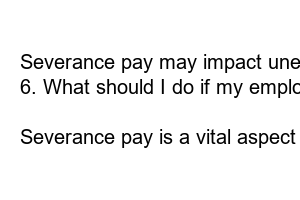퇴직금 조회
Title: Understanding Severance Pay: Your Comprehensive Guide
Introduction:
Are you curious about severance pay? Whether you are an employee or an employer, understanding the intricacies of severance pay is crucial. In this blog post, we will delve into what severance pay is, how it is calculated, why it is essential, and answer some frequently asked questions.
Subheadings:
1. What is Severance Pay?
Severance pay is a financial package provided to employees when they are laid off, terminated, or experience job loss due to no fault of their own. It serves as a form of compensation to help employees bridge gaps until they secure a new job.
2. How is Severance Pay Calculated?
Severance pay is primarily based on an employee’s length of service and salary. The formula usually involves a specific number of weeks or months of pay for each year of service. Additional factors like job level and industry standards may also come into play.
3. Does Every Employee Receive Severance Pay?
Not all employees are eligible for severance pay. It generally depends on various factors such as employment contracts, company policies, and local labor laws. However, it is more commonly provided for employees who are laid off due to downsizing, mergers, or restructuring.
4. Why is Severance Pay Important?
Severance pay provides a safety net for employees and a sense of security during a transitional period. It helps individuals cover their daily expenses, bridge gaps in unemployment benefits, and even pursue new job opportunities without financial strain. For employers, offering severance pay enhances their reputation and the goodwill with departing employees.
5. Factors Affecting Severance Pay Calculation
While each case may differ, several factors significantly impact the severance pay calculation. These include years of service, salary level, industry practices, any previous agreements between the employer and employee, and the reasons for job separation.
6. Negotiating Severance Pay
Employees may have the opportunity to negotiate their severance packages. It is crucial to approach the negotiation process with clarity, understanding their rights, and seeking professional advice to ensure fair compensation.
FAQs:
1. Is severance pay mandatory?
No, it is not mandatory in all jurisdictions, but many countries and organizations have made it a common practice.
2. Will I still receive severance pay if I voluntarily resign?
In most cases, severance pay is only provided when an employee is laid off or terminated. Voluntarily resigning usually results in forgoing severance benefits.
3. Can I receive severance pay if I am fired for misconduct?
Generally, severance pay is not provided to individuals who are terminated due to gross misconduct or violating company policies.
4. Are taxes deducted from severance pay?
Yes, severance pay is subject to taxes. The amount withheld depends on the applicable tax laws and regulations in your jurisdiction.
5. Will receiving severance pay affect my eligibility for unemployment benefits?
Severance pay may impact unemployment benefits, as different regions have varying regulations. It is essential to consult with local labor authorities or a qualified professional.
6. What should I do if my employer does not provide severance pay?
If you believe you are entitled to severance pay but your employer refuses to provide it, you may need to consult with an employment lawyer or relevant governmental agencies for guidance and potential legal action.
Summary:
Severance pay is a vital aspect of the employment landscape, providing financial security during job transitions. Calculated based on various factors, severance pay serves both employees and employers by facilitating a smooth and fair separation process. Understanding severance pay empowers individuals to protect their rights and navigate the intricacies of employment termination with confidence.

